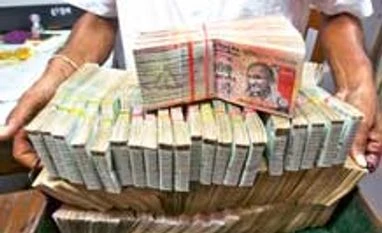For savers in fixed deposits, the days of better returns are here again. Following the recent hike of 25 basis points in the repo rate by the Reserve Bank of India, banks have again started to raise interest rates on fixed deposits. The hikes range between 25 and 125 basis points, largely for short-term deposits.
If you are looking for a regular place to park your savings, the prospects are enticing. For deposits of around six months to a year, rates now hover around the 7.5-per cent mark. On deposits of more than six months, rates are hovering around 8 per cent. On deposits of 40 to 91 days Canara Bank raised rates from 7 to 7.5 per cent, while on 91- to 179-day deposits Punjab National Bank raised rates from 6.75 to 7 per cent. On 271-day and above deposits, rates are now 8 per cent, up from 7.5 per cent. On 46 days to four months the Union Bank of India rate is now 7.5 per cent, up from 7.25 per cent.
On the other hand, long-term fixed-deposit rates such as those for over one year have not been raised and yields here are still not attractive enough. Fixed-deposit rates for one-year and above deposits hover around the 9 to 9.5-per cent mark.
Says Sunil Mishra, CEO, Karvy Private Wealth, "If someone wants fixed income and capital protection then these are good rates to lock into in a bank fixed deposit. But only for the short term."
Further, there are a few advantages with short-term bank FDs. According to certified financial planner Anil Rego, bank fixed deposits can be quickly encashed, though at a penalty of around 1 per cent. "So they have a better liquidity structure, as compared to FMPs which are not that liquid in the market," he says. But the tax efficiency of an FD is not favourable in the high tax bracket as both fixed deposits and fixed-maturity plans offer more or less similar post-tax returns.
Bank fixed deposits are a good option only for those in the lower tax bracket such as up to the 10 per cent tax bracket. Fixed deposits can yield post-tax returns of 7 or 7.5 per cent for them.
Locking in money for more than a year in bank fixed deposits does not optimise post-tax returns; hence, these investors are better off with a one-year and above FMP scheme. FMPs come with indexation benefits if held for over a year. Says Gaurav Mashruwala, certified financial planner: "One shouldn't look at fixed deposits if one is thinking of investing in fixed income for over a year. For a comparable investment, FMPs are much better." FMPs of over a year typically give around 8 to 9 per cent post-tax returns.
For now, financial planners say, investors should take advantage of the prevailing high interest rates in short-term FDs and begin to lock into them.
If you are looking for a regular place to park your savings, the prospects are enticing. For deposits of around six months to a year, rates now hover around the 7.5-per cent mark. On deposits of more than six months, rates are hovering around 8 per cent. On deposits of 40 to 91 days Canara Bank raised rates from 7 to 7.5 per cent, while on 91- to 179-day deposits Punjab National Bank raised rates from 6.75 to 7 per cent. On 271-day and above deposits, rates are now 8 per cent, up from 7.5 per cent. On 46 days to four months the Union Bank of India rate is now 7.5 per cent, up from 7.25 per cent.
On the other hand, long-term fixed-deposit rates such as those for over one year have not been raised and yields here are still not attractive enough. Fixed-deposit rates for one-year and above deposits hover around the 9 to 9.5-per cent mark.
Also Read
So how does the short-term hike in FD rates compare to other avenues like fixed maturity plans (FMPs) or tax-free bonds? For now, the short-term deposit rates are turning more attractive than an FMP of a similar tenure. Rates on FMPs are around 8 per cent, more or less the rates of bank fixed deposits.
Says Sunil Mishra, CEO, Karvy Private Wealth, "If someone wants fixed income and capital protection then these are good rates to lock into in a bank fixed deposit. But only for the short term."
Further, there are a few advantages with short-term bank FDs. According to certified financial planner Anil Rego, bank fixed deposits can be quickly encashed, though at a penalty of around 1 per cent. "So they have a better liquidity structure, as compared to FMPs which are not that liquid in the market," he says. But the tax efficiency of an FD is not favourable in the high tax bracket as both fixed deposits and fixed-maturity plans offer more or less similar post-tax returns.
Bank fixed deposits are a good option only for those in the lower tax bracket such as up to the 10 per cent tax bracket. Fixed deposits can yield post-tax returns of 7 or 7.5 per cent for them.
Locking in money for more than a year in bank fixed deposits does not optimise post-tax returns; hence, these investors are better off with a one-year and above FMP scheme. FMPs come with indexation benefits if held for over a year. Says Gaurav Mashruwala, certified financial planner: "One shouldn't look at fixed deposits if one is thinking of investing in fixed income for over a year. For a comparable investment, FMPs are much better." FMPs of over a year typically give around 8 to 9 per cent post-tax returns.
For now, financial planners say, investors should take advantage of the prevailing high interest rates in short-term FDs and begin to lock into them.
)